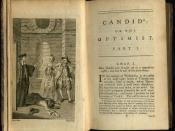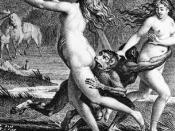El Dorado Explored
In chapter XVII, Candide and his manservant, Cacambo, enter the country of El Dorado. Here, Voltaire takes the opportunity to further satirize governments, religion, philosophy, and war. All of the religious figures Candide encounters throughout the story are corrupt and sexually promiscuous even though they have taken vows of chastity. El Dorado is a counter for all of the evils of Europe. He uses El Dorado rhetorically to contrast the vices of the real world. If you had not noticed the insanity of the Europeans in the world Voltaire paints, El Dorado, certainly gives a frame of reference.
At the beginning of the story, Candide is taught from very early in life by the philosopher, Pangloss, that we all live in the best of all possible worlds. Candide accepts this philosophy without question. He has experienced nothing of the outside world. Candide has experienced no cruelty or evil.
He has seen no misery or suffering. From his perspective, he is living is the best of all worlds. He is an innocent.
Candide is abruptly removed from his comfortable existence at the Baron's castle in Westphalia and hurled headlong into the wide world. At this point, Voltaire makes his innocence more apparent by showing that Candide is not frightened at his situation. His philosophy sustains him by making him believe that since he is in the best of all possible situations or worlds, everything is turning out for the best. The only thing that he laments is the loss of his love, Cunegund. Immediately, upon entering the outside world, Candide is preyed upon by the foulest of men and almost killed a number of times. Again, he is kept going by his optimism and by the thought that he might see his dear love 675...


